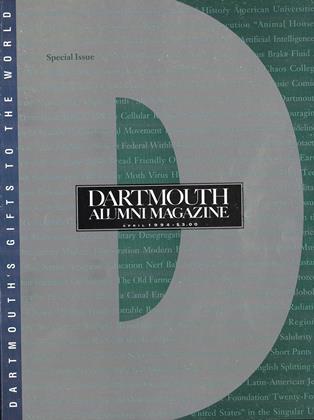In keeping with this month's Alumni Magazine's theme of people who are making a difference, I thought I'd catch up with some classmates who are doing medical research, about as worthwhile a life's work as I can think of.
Marty Weiss, at USC, is experimenting with the abortion drag RU486 to control non-malignant brain tumors in women and also is working on ways to genetically alter a tumor of the pituitary gland. In the past he helped develop a means of treating gleoblastomas, the most comon type of malignant brain tumor, by injecting them with a herpes virus that goes into the tumor cells' DNA and kills them.
Jon K. Meyer is a psychiatrist at the Medical College of Wisconsin in Milwaukee who works on gender-identity disorders and in 1982 wrote what's regarded as the classic text in the field. Jon says that biology, life experience, and mental factors all contribute to homosexuality, transsexuality, transvestitism, and "normal" gender identification.
Bob Mathog an otolaryngologist and department chairman at Wayne State University in Detroit, has done work on helping head and neck cancer patients restore their ability to swallow.
Charles Flickinger chairman of the anatomy department and cell biology at the University of Virginia, is a specialist in male reproductive cell biology. He's studied the effects of vasectomies and their reversal and the maturation of sperm cells.
George Rodgers, a toxicologist at the University of Louisville, has done research on lead poisoning, does clinical work in the critical care unit at Louisville Children's Hospital, and runs a regional poison center for the State of Kentucky. He is also involved in research into rotoviruses that cause gastrointestinal illnesses and a million deaths a year in the third world.
Graham Rogeness, a psychiatrist at the University of Texas at San Antonio, does research into the relationsip between brain chemistry and psychological conditions such as anxiety and depression. He says that Prozac is good stuff.
Other classmates who are involved in medical research include Adrian Parsegian, at the National Institutes of Health; Alan Shons, at Case-Western Reserve; John Kersey, at the U. of Minnesota; Bill Pratt, at Michigan; Bill Davidson, Maryland; Art Kopelman, East Carolina; Bob Kenerson at Harvard; and Shiao-Wei Shen a the Department of Health and Human Services. If I've missed anyone, please let me know.
Meantime, the latest from treasure hunter Duncan Mathewson is that for the past three years his National Center for Shipwreck Research in Florida has been scouting a Manila galleon that sank off of Guam in 1690 carrying a large cargo of silver coins from Mexico to the Philippines. Duncan's most famous haul was the reported $400-million worth of gold recovered in 1985 from the Atocha a Spanish galleon that sank in 1622 off Key West. Duncan claims that $400 million is exaggerated, but won't say by how much. On the side, he's working on a Ph.D. and a school curriculum in marine environmental studies.
Others doing good: Bruce Hasenkamp, executive director of the St. Francis Hospital Foundation in San Francisco, was elected president of the Medical Board of California, the third non-physician to hold that post in 117 years. Bruce's son Peter was accepted on early admission for the Dartmouth class of '98. And Denny Goodman's Teams and Tutors program has 56 tutors at work helping athletes at six inner-city high schools in D.C.
7405 Ridgewood Ave., Chevy Chase, MD 20815
 View Full Issue
View Full Issue
More From This Issue
-
 Cover Story
Cover StoryROSTER OF DARTMOUTH'S GIFTS TO THE WORLD
April 1994 -
 Article
ArticleThe Greatest Books by Dartmouth Authors
April 1994 -
 Class Notes
Class Notes1993
April 1994 By Christopher K. Onken, -
 Class Notes
Class Notes1981
April 1994 By Karen McKeel Calby, -
 Class Notes
Class Notes1989
April 1994 By Dan Parish, -
 Class Notes
Class Notes1983
April 1994 By Deborah Michel Rosch.
Morton Kondracke
Class Notes
-
 Class Notes
Class NotesClass of 1892
MARCH, 1927 By Arthur M. Strong -
 Class Notes
Class Notes1966
DECEMBER • 1986 By Charles D. Vernon -
 Class Notes
Class Notes1986
MARCH | APRIL 2014 By Davida (Sherman) Dinerman, Mark Greenstein -
 Class Notes
Class Notes1950
May 1975 By JACQUES HARLOW, JOHN C. HARNED -
 Class Notes
Class Notes1952
JANUARY/FEBRUARY 1986 By Marcel C. Durot -
 Class Notes
Class Notes1950's "Fantastic Fifth"
July 1954 By SCOTT C. OLIN '50








